Attached files
| file | filename |
|---|---|
| 8-K - 8-K 10.19.16 - CALADRIUS BIOSCIENCES, INC. | a8-k101916.htm |
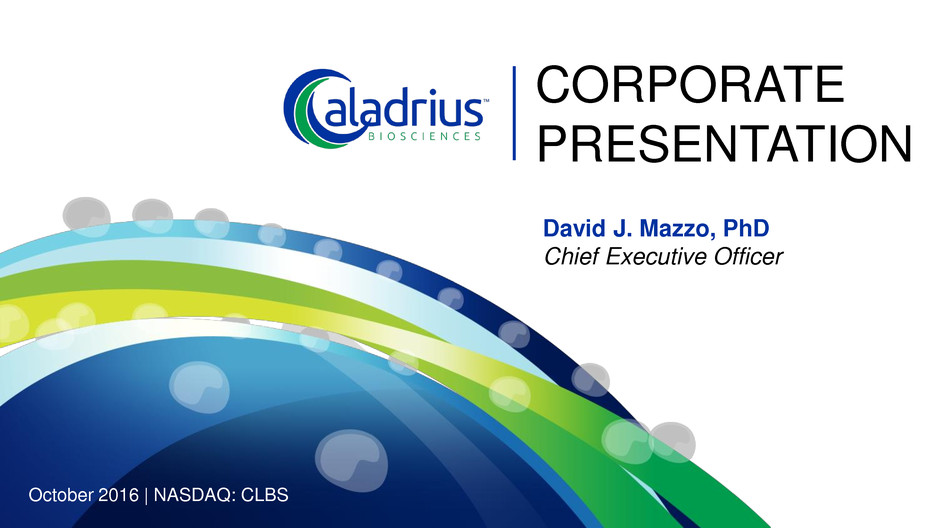
CORPORATE
PRESENTATION
David J. Mazzo, PhD
Chief Executive Officer
October 2016 | NASDAQ: CLBS
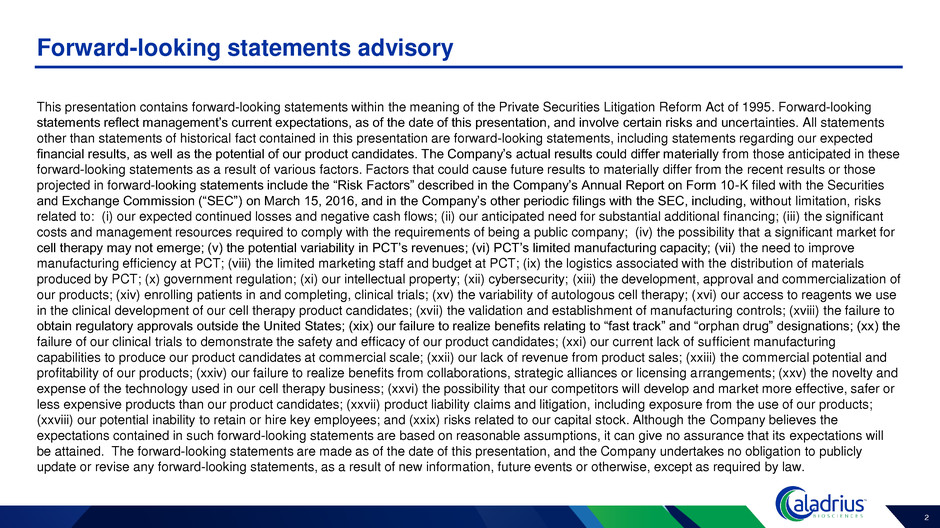
Forward-looking statements advisory
This presentation contains forward-looking statements within the meaning of the Private Securities Litigation Reform Act of 1995. Forward-looking
statements reflect management’s current expectations, as of the date of this presentation, and involve certain risks and uncertainties. All statements
other than statements of historical fact contained in this presentation are forward-looking statements, including statements regarding our expected
financial results, as well as the potential of our product candidates. The Company’s actual results could differ materially from those anticipated in these
forward-looking statements as a result of various factors. Factors that could cause future results to materially differ from the recent results or those
projected in forward-looking statements include the “Risk Factors” described in the Company’s Annual Report on Form 10-K filed with the Securities
and Exchange Commission (“SEC”) on March 15, 2016, and in the Company’s other periodic filings with the SEC, including, without limitation, risks
related to: (i) our expected continued losses and negative cash flows; (ii) our anticipated need for substantial additional financing; (iii) the significant
costs and management resources required to comply with the requirements of being a public company; (iv) the possibility that a significant market for
cell therapy may not emerge; (v) the potential variability in PCT’s revenues; (vi) PCT’s limited manufacturing capacity; (vii) the need to improve
manufacturing efficiency at PCT; (viii) the limited marketing staff and budget at PCT; (ix) the logistics associated with the distribution of materials
produced by PCT; (x) government regulation; (xi) our intellectual property; (xii) cybersecurity; (xiii) the development, approval and commercialization of
our products; (xiv) enrolling patients in and completing, clinical trials; (xv) the variability of autologous cell therapy; (xvi) our access to reagents we use
in the clinical development of our cell therapy product candidates; (xvii) the validation and establishment of manufacturing controls; (xviii) the failure to
obtain regulatory approvals outside the United States; (xix) our failure to realize benefits relating to “fast track” and “orphan drug” designations; (xx) the
failure of our clinical trials to demonstrate the safety and efficacy of our product candidates; (xxi) our current lack of sufficient manufacturing
capabilities to produce our product candidates at commercial scale; (xxii) our lack of revenue from product sales; (xxiii) the commercial potential and
profitability of our products; (xxiv) our failure to realize benefits from collaborations, strategic alliances or licensing arrangements; (xxv) the novelty and
expense of the technology used in our cell therapy business; (xxvi) the possibility that our competitors will develop and market more effective, safer or
less expensive products than our product candidates; (xxvii) product liability claims and litigation, including exposure from the use of our products;
(xxviii) our potential inability to retain or hire key employees; and (xxix) risks related to our capital stock. Although the Company believes the
expectations contained in such forward-looking statements are based on reasonable assumptions, it can give no assurance that its expectations will
be attained. The forward-looking statements are made as of the date of this presentation, and the Company undertakes no obligation to publicly
update or revise any forward-looking statements, as a result of new information, future events or otherwise, except as required by law.
2
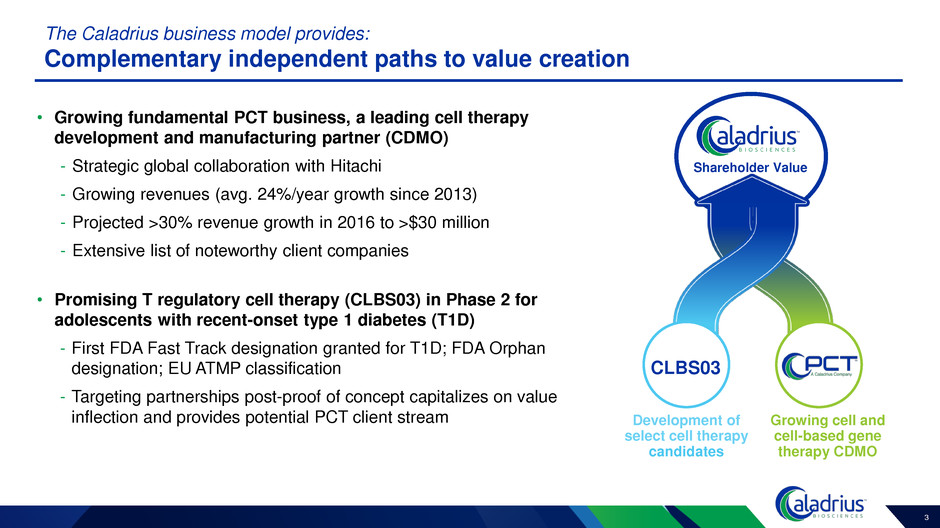
The Caladrius business model provides:
Complementary independent paths to value creation
• Growing fundamental PCT business, a leading cell therapy
development and manufacturing partner (CDMO)
- Strategic global collaboration with Hitachi
- Growing revenues (avg. 24%/year growth since 2013)
- Projected >30% revenue growth in 2016 to >$30 million
- Extensive list of noteworthy client companies
• Promising T regulatory cell therapy (CLBS03) in Phase 2 for
adolescents with recent-onset type 1 diabetes (T1D)
- First FDA Fast Track designation granted for T1D; FDA Orphan
designation; EU ATMP classification
- Targeting partnerships post-proof of concept capitalizes on value
inflection and provides potential PCT client stream
3
Shareholder Value
Development of
select cell therapy
candidates
Growing cell and
cell-based gene
therapy CDMO
CLBS03
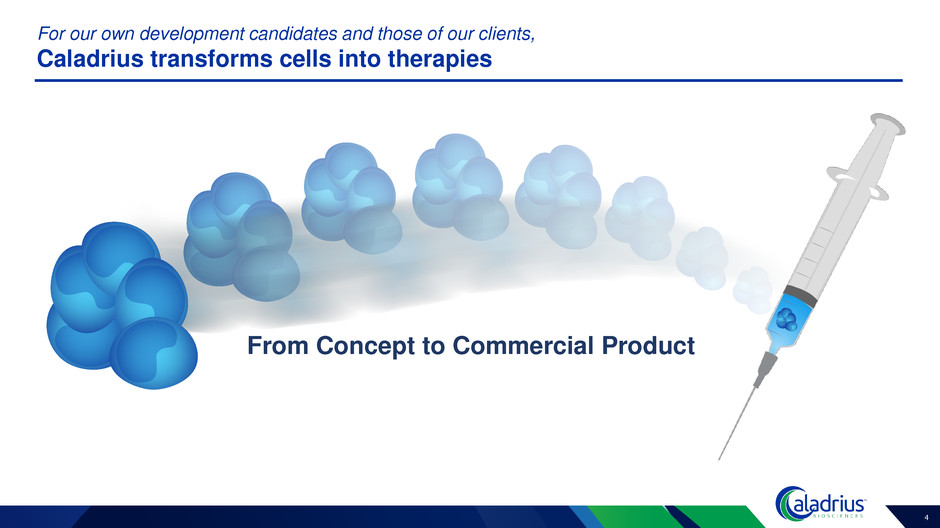
For our own development candidates and those of our clients,
Caladrius transforms cells into therapies
From Concept to Commercial Product
4
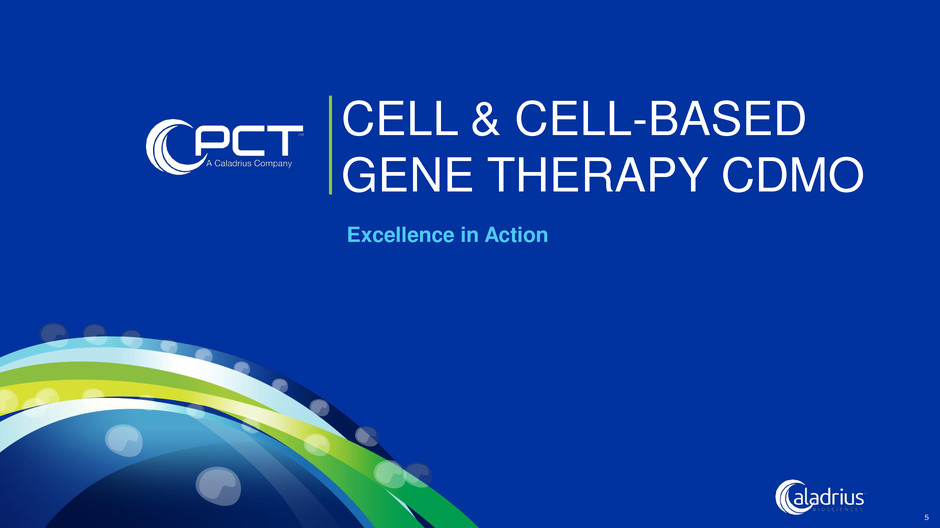
CELL & CELL-BASED
GENE THERAPY CDMO
Excellence in Action
5
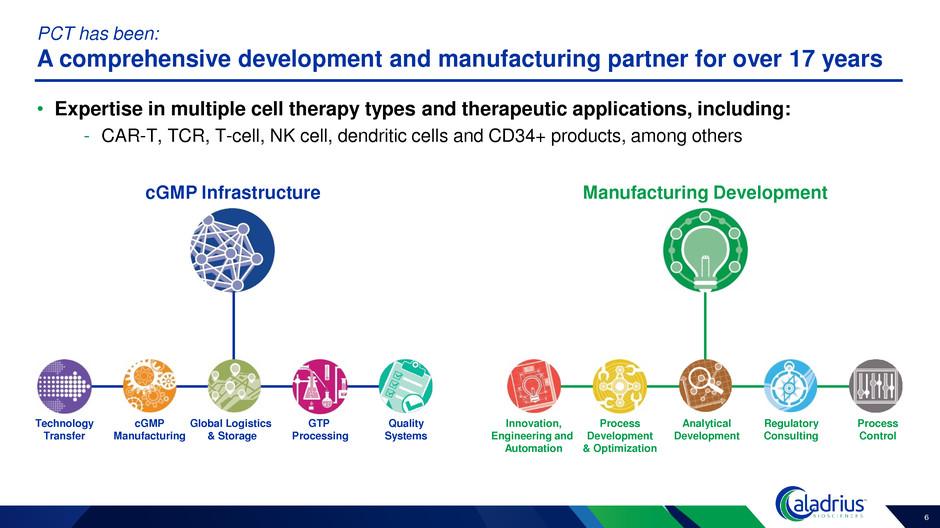
PCT has been:
A comprehensive development and manufacturing partner for over 17 years
• Expertise in multiple cell therapy types and therapeutic applications, including:
- CAR-T, TCR, T-cell, NK cell, dendritic cells and CD34+ products, among others
6
cGMP Infrastructure Manufacturing Development
cGMP
Manufacturing
Technology
Transfer
Quality
Systems
GTP
Processing
Global Logistics
& Storage
Innovation,
Engineering and
Automation
Process
Development
& Optimization
Analytical
Development
Regulatory
Consulting
Process
Control
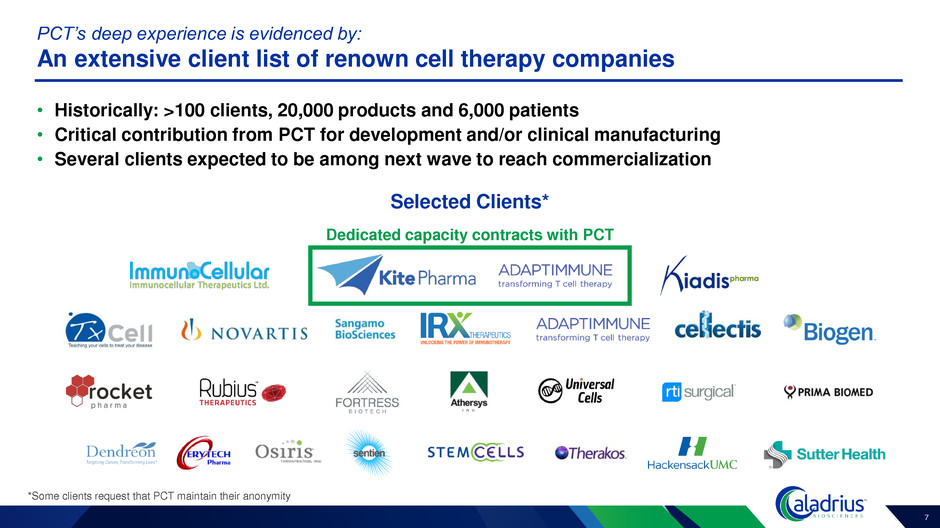
PCT’s deep experience is evidenced by:
An extensive client list of renown cell therapy companies
• Historically: >100 clients, 20,000 products and 6,000 patients
• Critical contribution from PCT for development and/or clinical manufacturing
• Several clients expected to be among next wave to reach commercialization
7
*Some clients request that PCT maintain their anonymity
Selected Clients*
Dedicated capacity contracts with PCT
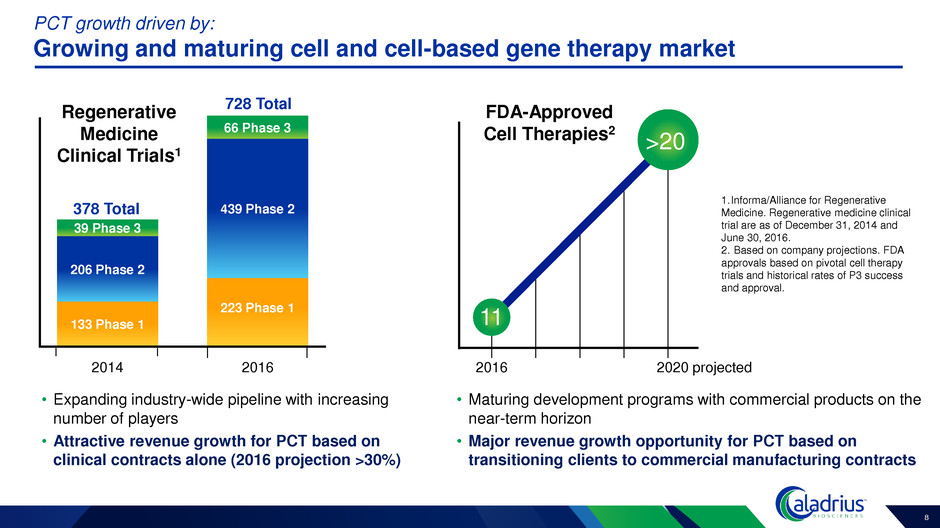
1.Informa/Alliance for Regenerative
Medicine. Regenerative medicine clinical
trial are as of December 31, 2014 and
June 30, 2016.
2. Based on company projections. FDA
approvals based on pivotal cell therapy
trials and historical rates of P3 success
and approval.
• Expanding industry-wide pipeline with increasing
number of players
• Attractive revenue growth for PCT based on
clinical contracts alone (2016 projection >30%)
• Maturing development programs with commercial products on the
near-term horizon
• Major revenue growth opportunity for PCT based on
transitioning clients to commercial manufacturing contracts
378 Total
Regenerative
Medicine
Clinical Trials1
FDA-Approved
Cell Therapies2
11
>20
2016 2020 projected 2014 2016
206 Phase 2
39 Phase 3
728 Total
133 Phase 1
66 Phase 3
223 Phase 1
439 Phase 2
8
PCT growth driven by:
Growing and maturing cell and cell-based gene therapy market
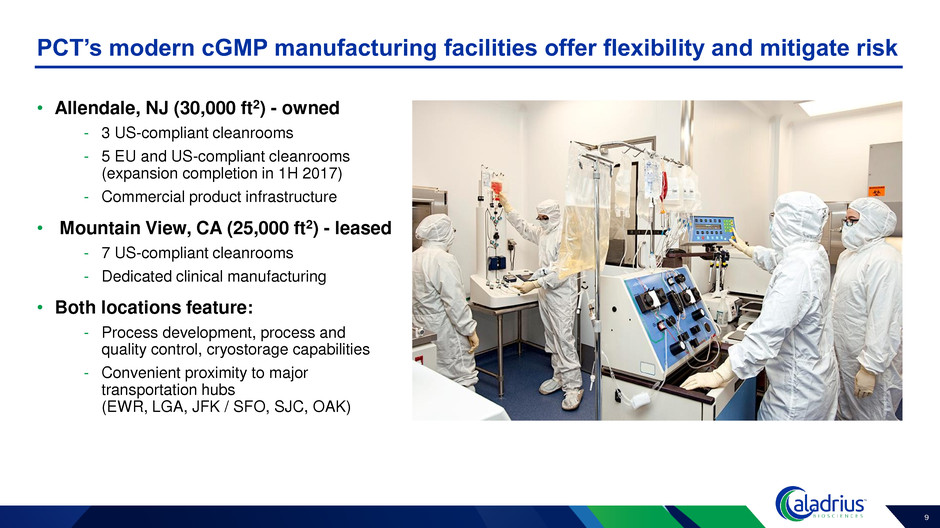
PCT’s modern cGMP manufacturing facilities offer flexibility and mitigate risk
• Allendale, NJ (30,000 ft2) - owned
- 3 US-compliant cleanrooms
- 5 EU and US-compliant cleanrooms
(expansion completion in 1H 2017)
- Commercial product infrastructure
• Mountain View, CA (25,000 ft2) - leased
- 7 US-compliant cleanrooms
- Dedicated clinical manufacturing
• Both locations feature:
- Process development, process and
quality control, cryostorage capabilities
- Convenient proximity to major
transportation hubs
(EWR, LGA, JFK / SFO, SJC, OAK)
9
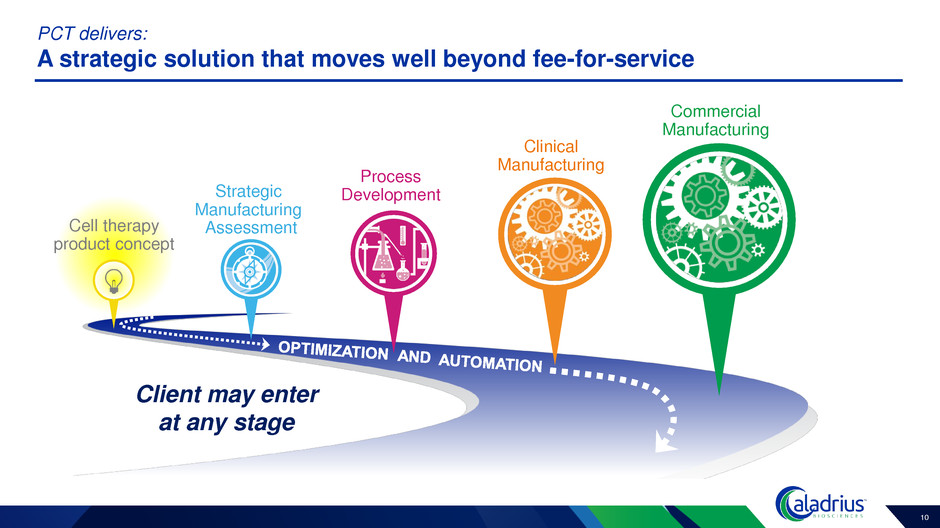
PCT delivers:
A strategic solution that moves well beyond fee-for-service
10
Clinical
Manufacturing
Process
Development
Commercial
Manufacturing
Strategic
Manufacturing
Assessment Cell therapy
product concept
Client may enter
at any stage
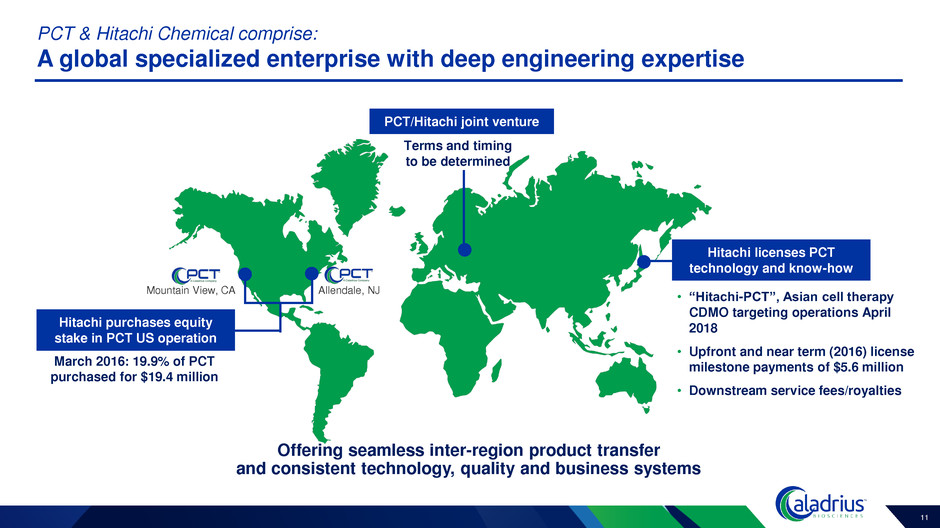
Offering seamless inter-region product transfer
and consistent technology, quality and business systems
Hitachi purchases equity
stake in PCT US operation
March 2016: 19.9% of PCT
purchased for $19.4 million
Allendale, NJ Mountain View, CA
PCT/Hitachi joint venture
Terms and timing
to be determined
Hitachi licenses PCT
technology and know-how
• “Hitachi-PCT”, Asian cell therapy
CDMO targeting operations April
2018
• Upfront and near term (2016) license
milestone payments of $5.6 million
• Downstream service fees/royalties
PCT & Hitachi Chemical comprise:
A global specialized enterprise with deep engineering expertise
11
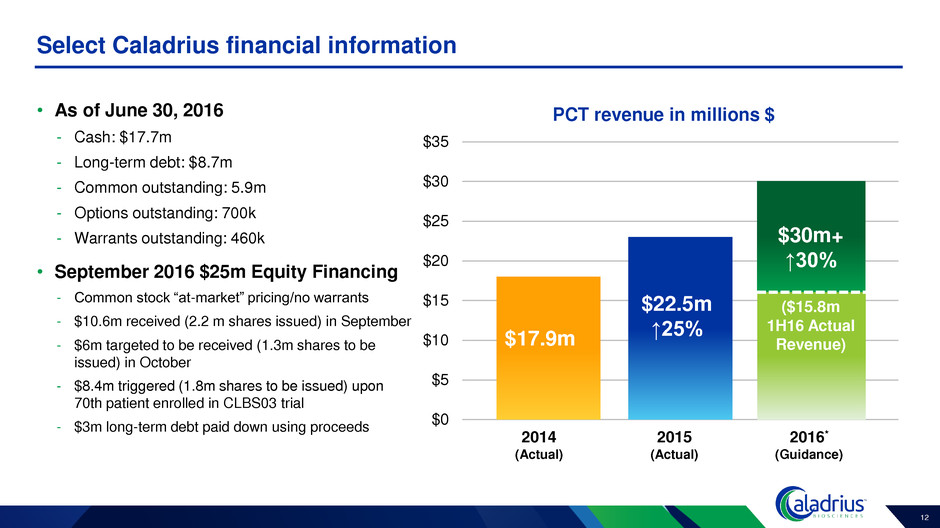
$0
$5
$10
$15
$20
$25
$30
$35
PCT revenue in millions $
Select Caladrius financial information
• As of June 30, 2016
- Cash: $17.7m
- Long-term debt: $8.7m
- Common outstanding: 5.9m
- Options outstanding: 700k
- Warrants outstanding: 460k
• September 2016 $25m Equity Financing
- Common stock “at-market” pricing/no warrants
- $10.6m received (2.2 m shares issued) in September
- $6m targeted to be received (1.3m shares to be
issued) in October
- $8.4m triggered (1.8m shares to be issued) upon
70th patient enrolled in CLBS03 trial
- $3m long-term debt paid down using proceeds
2014
(Actual)
2015
(Actual)
2016*
(Guidance)
$22.5m
↑25% $17.9m
12
$30m+
↑30%
($15.8m
1H16 Actual
Revenue)
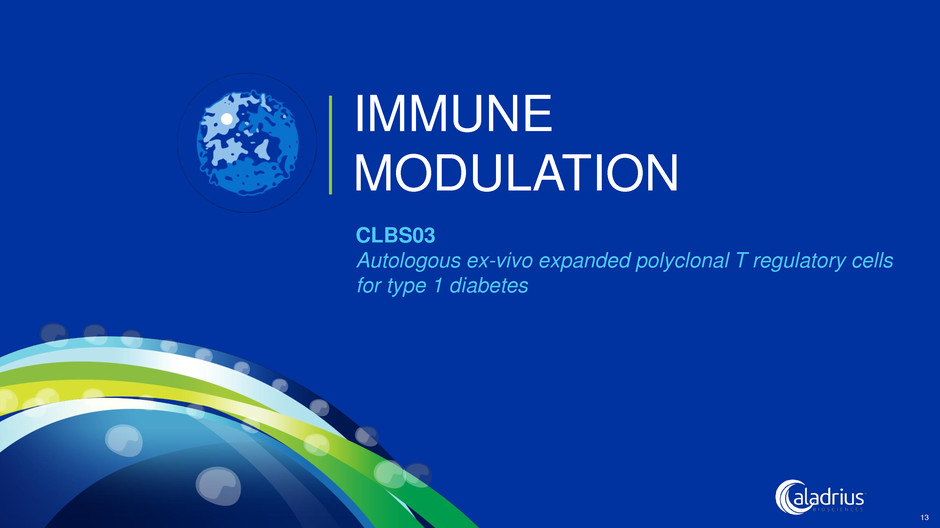
IMMUNE
MODULATION
CLBS03
Autologous ex-vivo expanded polyclonal T regulatory cells
for type 1 diabetes
13
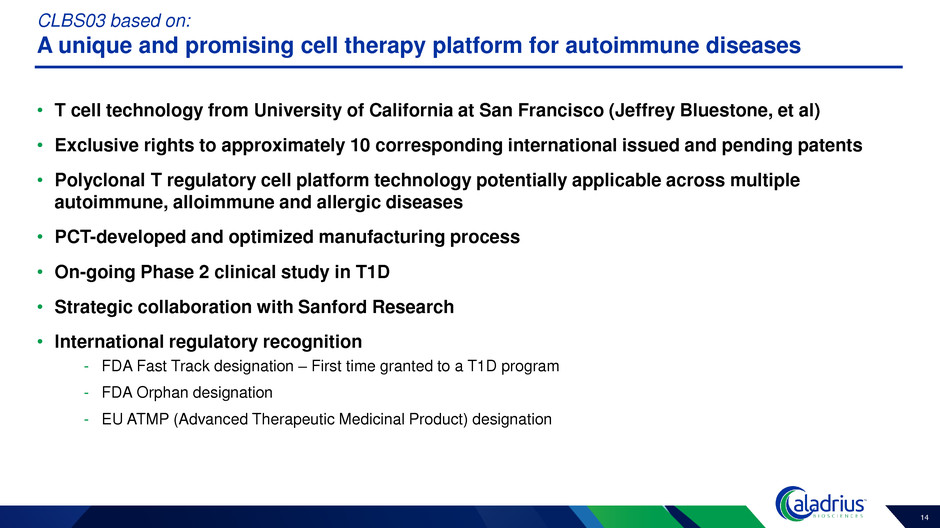
CLBS03 based on:
A unique and promising cell therapy platform for autoimmune diseases
• T cell technology from University of California at San Francisco (Jeffrey Bluestone, et al)
• Exclusive rights to approximately 10 corresponding international issued and pending patents
• Polyclonal T regulatory cell platform technology potentially applicable across multiple
autoimmune, alloimmune and allergic diseases
• PCT-developed and optimized manufacturing process
• On-going Phase 2 clinical study in T1D
• Strategic collaboration with Sanford Research
• International regulatory recognition
- FDA Fast Track designation – First time granted to a T1D program
- FDA Orphan designation
- EU ATMP (Advanced Therapeutic Medicinal Product) designation
14
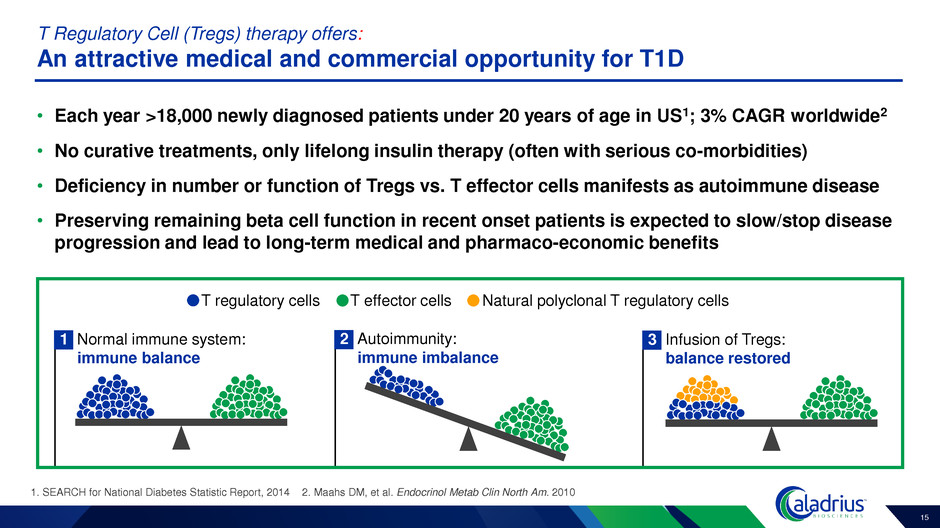
T Regulatory Cell (Tregs) therapy offers:
An attractive medical and commercial opportunity for T1D
• Each year >18,000 newly diagnosed patients under 20 years of age in US1; 3% CAGR worldwide2
• No curative treatments, only lifelong insulin therapy (often with serious co-morbidities)
• Deficiency in number or function of Tregs vs. T effector cells manifests as autoimmune disease
• Preserving remaining beta cell function in recent onset patients is expected to slow/stop disease
progression and lead to long-term medical and pharmaco-economic benefits
1. SEARCH for National Diabetes Statistic Report, 2014 2. Maahs DM, et al. Endocrinol Metab Clin North Am. 2010
1 Normal immune system:
immune balance
2 Autoimmunity:
immune imbalance
3 Infusion of Tregs:
balance restored
T regulatory cells T effector cells Natural polyclonal T regulatory cells
15
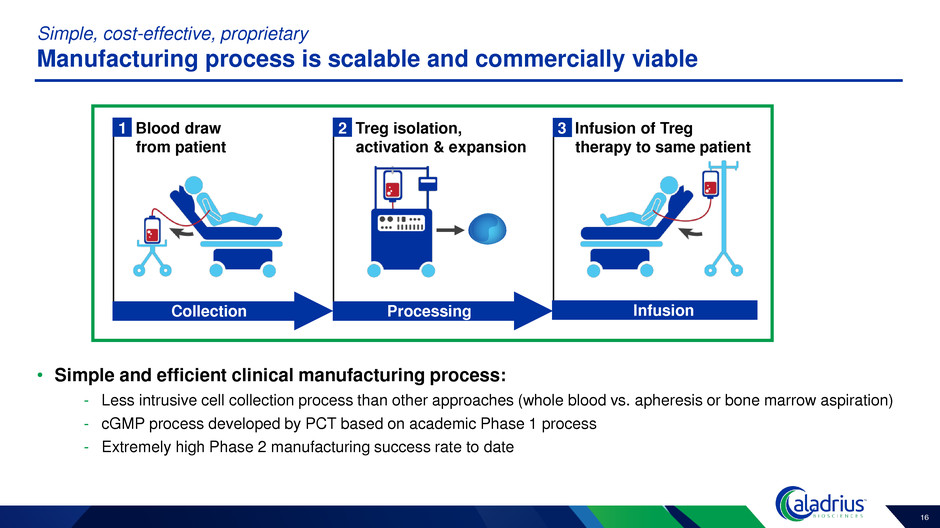
Simple, cost-effective, proprietary
Manufacturing process is scalable and commercially viable
• Simple and efficient clinical manufacturing process:
- Less intrusive cell collection process than other approaches (whole blood vs. apheresis or bone marrow aspiration)
- cGMP process developed by PCT based on academic Phase 1 process
- Extremely high Phase 2 manufacturing success rate to date
1 Blood draw
from patient
3 Infusion of Treg
therapy to same patient
Collection Processing Infusion
2 Treg isolation,
activation & expansion
16
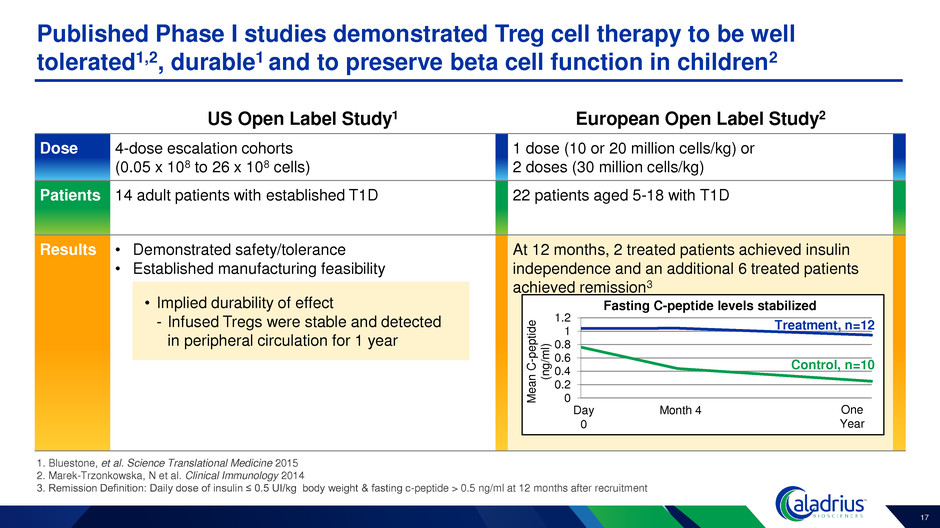
US Open Label Study1 European Open Label Study2
Dose 4-dose escalation cohorts
(0.05 x 108 to 26 x 108 cells)
1 dose (10 or 20 million cells/kg) or
2 doses (30 million cells/kg)
Patients 14 adult patients with established T1D 22 patients aged 5-18 with T1D
Results • Demonstrated safety/tolerance
• Established manufacturing feasibility
• Implied durability of effect
- Infused Tregs were stable and detected
in peripheral circulation for 1 year
At 12 months, 2 treated patients achieved insulin
independence and an additional 6 treated patients
achieved remission3
Published Phase I studies demonstrated Treg cell therapy to be well
tolerated1,2, durable1
and to preserve beta cell function in children2
1. Bluestone, et al. Science Translational Medicine 2015
2. Marek-Trzonkowska, N et al. Clinical Immunology 2014
3. Remission Definition: Daily dose of insulin ≤ 0.5 UI/kg body weight & fasting c-peptide > 0.5 ng/ml at 12 months after recruitment
0
0.2
0.4
0.6
0.8
1
1.2
M
e
a
n
C
-p
e
p
ti
d
e
(n
g
/m
l)
Fasting C-peptide levels stabilized
One
Year
Control, n=10
Treatment, n=12
Day
0
Month 4
17
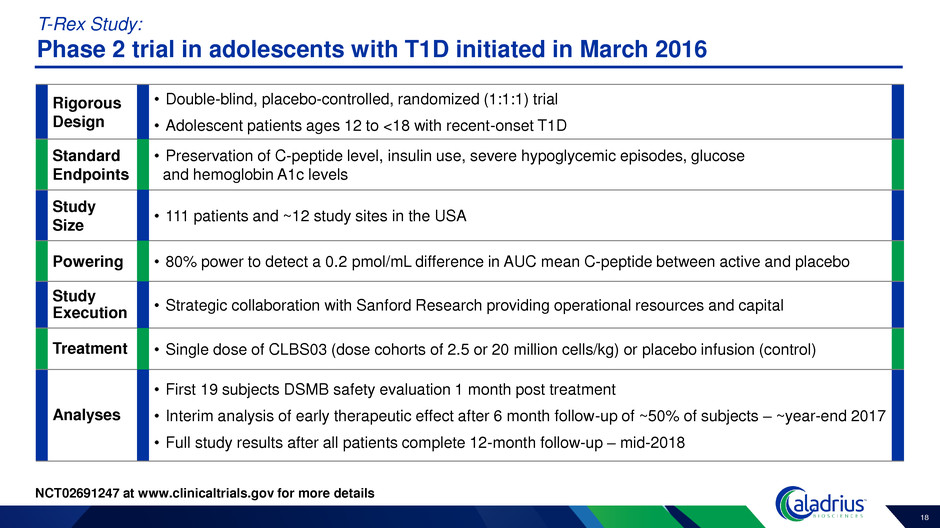
Rigorous
Design
• Double-blind, placebo-controlled, randomized (1:1:1) trial
• Adolescent patients ages 12 to <18 with recent-onset T1D
Standard
Endpoints
• Preservation of C-peptide level, insulin use, severe hypoglycemic episodes, glucose
and hemoglobin A1c levels
Study
Size
• 111 patients and ~12 study sites in the USA
Powering • 80% power to detect a 0.2 pmol/mL difference in AUC mean C-peptide between active and placebo
Study
Execution • Strategic collaboration with Sanford Research providing operational resources and capital
Treatment • Single dose of CLBS03 (dose cohorts of 2.5 or 20 million cells/kg) or placebo infusion (control)
Analyses
• First 19 subjects DSMB safety evaluation 1 month post treatment
• Interim analysis of early therapeutic effect after 6 month follow-up of ~50% of subjects – ~year-end 2017
• Full study results after all patients complete 12-month follow-up – mid-2018
T-Rex Study:
Phase 2 trial in adolescents with T1D initiated in March 2016
NCT02691247 at www.clinicaltrials.gov for more details
18
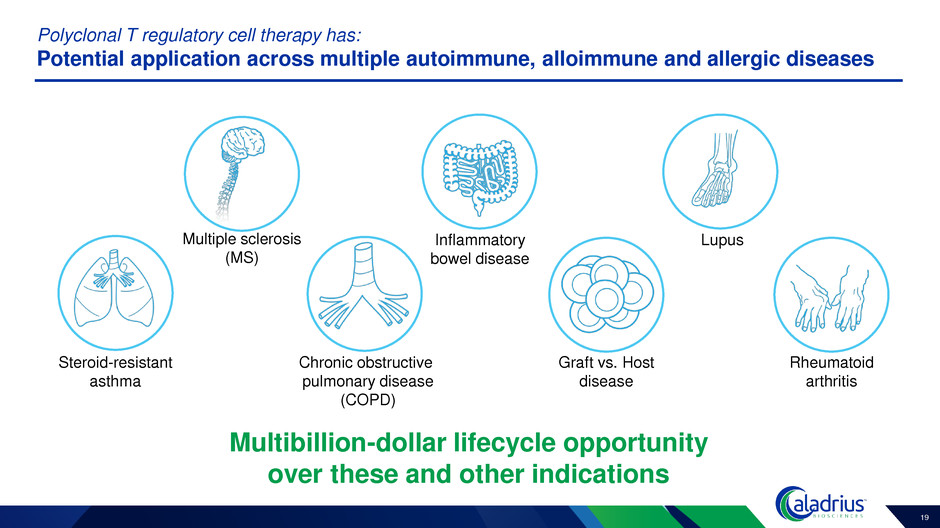
Polyclonal T regulatory cell therapy has:
Potential application across multiple autoimmune, alloimmune and allergic diseases
19
Multibillion-dollar lifecycle opportunity
over these and other indications
Steroid-resistant
asthma
Multiple sclerosis
(MS)
Chronic obstructive
pulmonary disease
(COPD)
Inflammatory
bowel disease
Graft vs. Host
disease
Rheumatoid
arthritis
Lupus
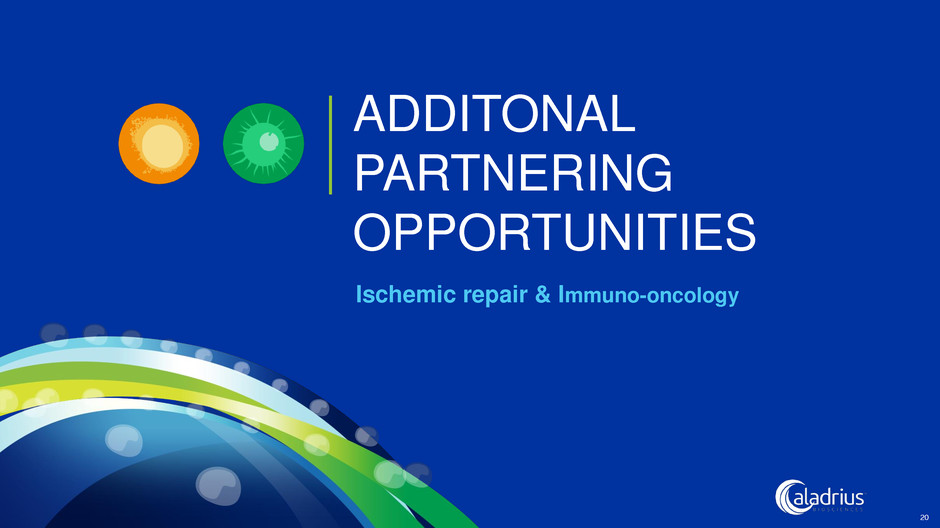
ADDITONAL
PARTNERING
OPPORTUNITIES
Ischemic repair & Immuno-oncology
20
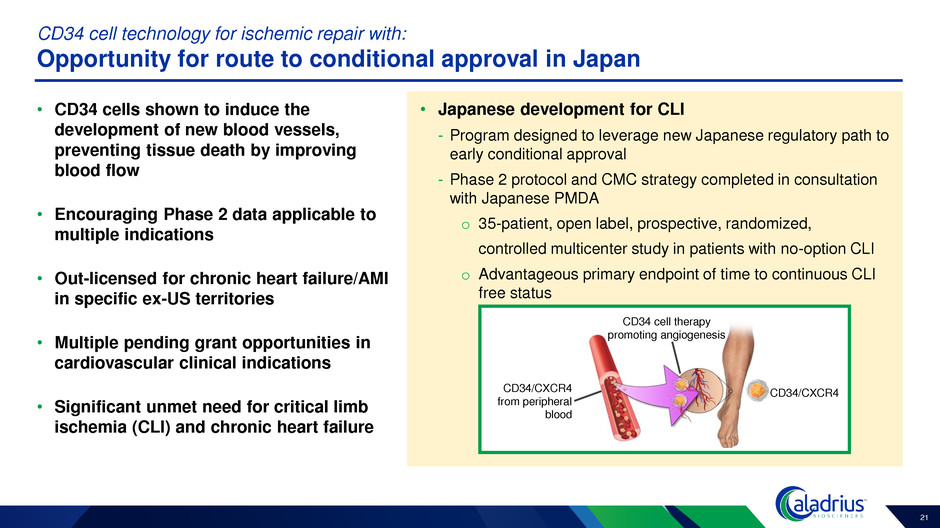
CD34 cell technology for ischemic repair with:
Opportunity for route to conditional approval in Japan
• CD34 cells shown to induce the
development of new blood vessels,
preventing tissue death by improving
blood flow
• Encouraging Phase 2 data applicable to
multiple indications
• Out-licensed for chronic heart failure/AMI
in specific ex-US territories
• Multiple pending grant opportunities in
cardiovascular clinical indications
• Significant unmet need for critical limb
ischemia (CLI) and chronic heart failure
21
CD34/CXCR4
from peripheral
blood
CD34 cell therapy
promoting angiogenesis
CD34/CXCR4
• Japanese development for CLI
- Program designed to leverage new Japanese regulatory path to
early conditional approval
- Phase 2 protocol and CMC strategy completed in consultation
with Japanese PMDA
o 35-patient, open label, prospective, randomized,
controlled multicenter study in patients with no-option CLI
o Advantageous primary endpoint of time to continuous CLI
free status
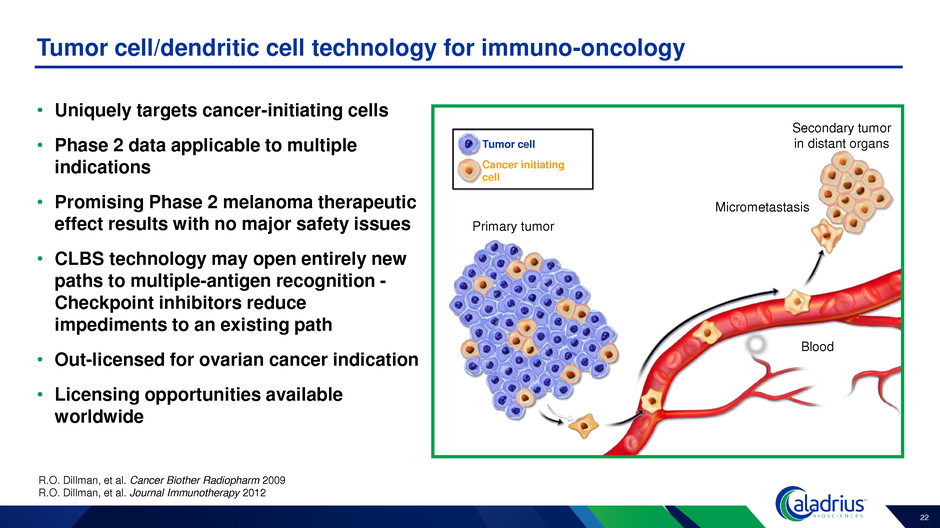
Tumor cell/dendritic cell technology for immuno-oncology
• Uniquely targets cancer-initiating cells
• Phase 2 data applicable to multiple
indications
• Promising Phase 2 melanoma therapeutic
effect results with no major safety issues
• CLBS technology may open entirely new
paths to multiple-antigen recognition -
Checkpoint inhibitors reduce
impediments to an existing path
• Out-licensed for ovarian cancer indication
• Licensing opportunities available
worldwide
22
R.O. Dillman, et al. Cancer Biother Radiopharm 2009
R.O. Dillman, et al. Journal Immunotherapy 2012
Tumor cell
Cancer initiating
cell
Primary tumor
Micrometastasis
Secondary tumor
in distant organs
Blood
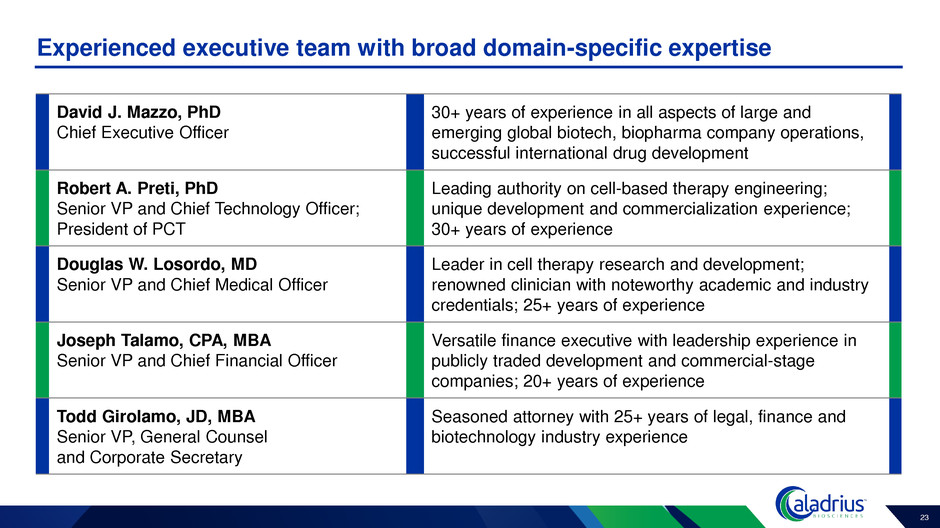
Experienced executive team with broad domain-specific expertise
David J. Mazzo, PhD
Chief Executive Officer
30+ years of experience in all aspects of large and
emerging global biotech, biopharma company operations,
successful international drug development
Robert A. Preti, PhD
Senior VP and Chief Technology Officer;
President of PCT
Leading authority on cell-based therapy engineering;
unique development and commercialization experience;
30+ years of experience
Douglas W. Losordo, MD
Senior VP and Chief Medical Officer
Leader in cell therapy research and development;
renowned clinician with noteworthy academic and industry
credentials; 25+ years of experience
Joseph Talamo, CPA, MBA
Senior VP and Chief Financial Officer
Versatile finance executive with leadership experience in
publicly traded development and commercial-stage
companies; 20+ years of experience
Todd Girolamo, JD, MBA
Senior VP, General Counsel
and Corporate Secretary
Seasoned attorney with 25+ years of legal, finance and
biotechnology industry experience
23
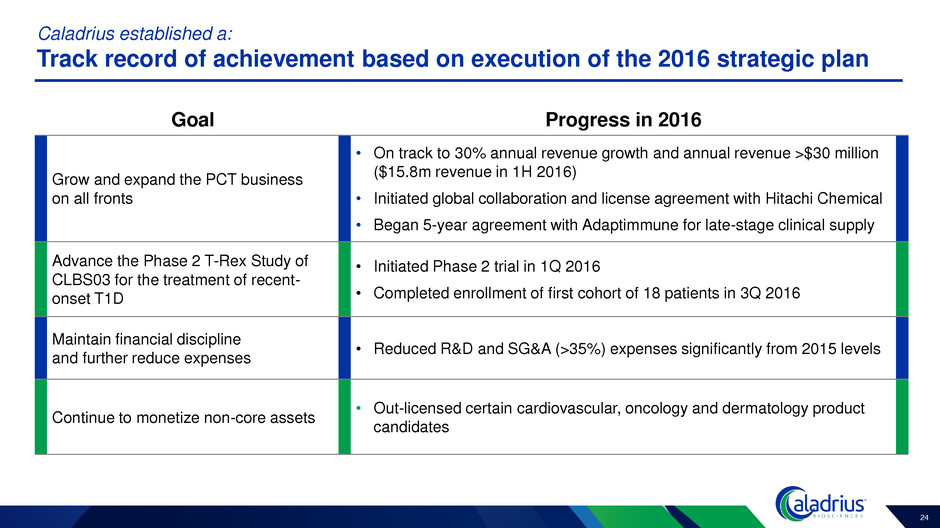
Goal Progress in 2016
Grow and expand the PCT business
on all fronts
• On track to 30% annual revenue growth and annual revenue >$30 million
($15.8m revenue in 1H 2016)
• Initiated global collaboration and license agreement with Hitachi Chemical
• Began 5-year agreement with Adaptimmune for late-stage clinical supply
Advance the Phase 2 T-Rex Study of
CLBS03 for the treatment of recent-
onset T1D
• Initiated Phase 2 trial in 1Q 2016
• Completed enrollment of first cohort of 18 patients in 3Q 2016
Maintain financial discipline
and further reduce expenses
• Reduced R&D and SG&A (>35%) expenses significantly from 2015 levels
Continue to monetize non-core assets
• Out-licensed certain cardiovascular, oncology and dermatology product
candidates
Caladrius established a:
Track record of achievement based on execution of the 2016 strategic plan
24
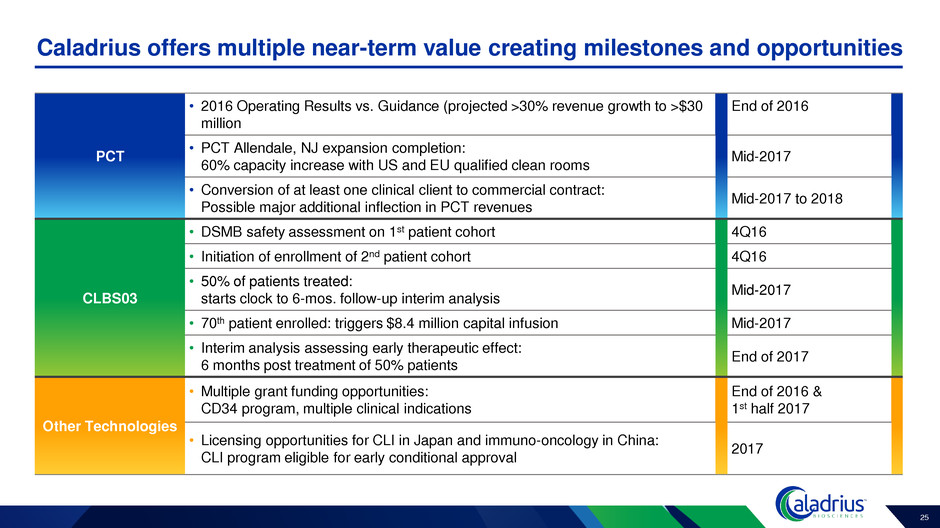
PCT
• 2016 Operating Results vs. Guidance (projected >30% revenue growth to >$30
million
End of 2016
• PCT Allendale, NJ expansion completion:
60% capacity increase with US and EU qualified clean rooms
Mid-2017
• Conversion of at least one clinical client to commercial contract:
Possible major additional inflection in PCT revenues
Mid-2017 to 2018
CLBS03
• DSMB safety assessment on 1st patient cohort 4Q16
• Initiation of enrollment of 2nd patient cohort 4Q16
• 50% of patients treated:
starts clock to 6-mos. follow-up interim analysis
Mid-2017
• 70th patient enrolled: triggers $8.4 million capital infusion Mid-2017
• Interim analysis assessing early therapeutic effect:
6 months post treatment of 50% patients
End of 2017
Other Technologies
• Multiple grant funding opportunities:
CD34 program, multiple clinical indications
End of 2016 &
1st half 2017
• Licensing opportunities for CLI in Japan and immuno-oncology in China:
CLI program eligible for early conditional approval
2017
Caladrius offers multiple near-term value creating milestones and opportunities
25
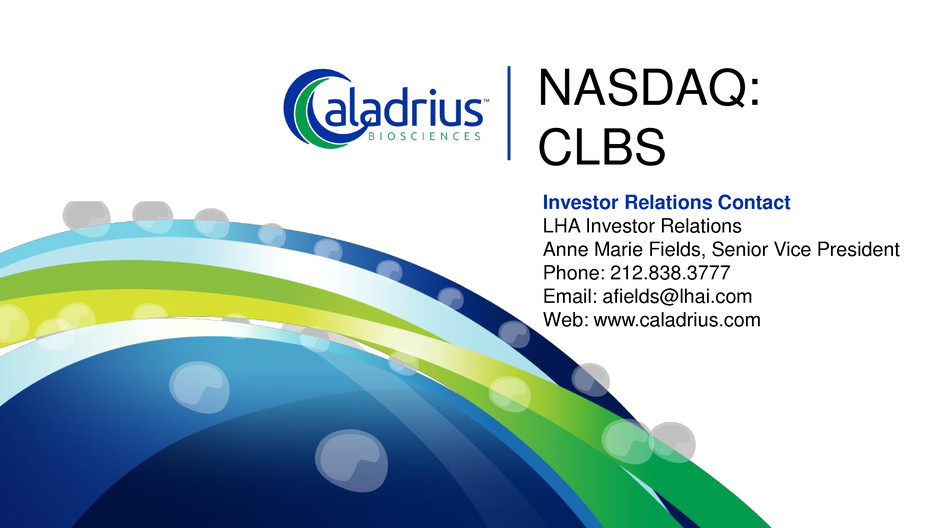
NASDAQ:
CLBS
Investor Relations Contact
LHA Investor Relations
Anne Marie Fields, Senior Vice President
Phone: 212.838.3777
Email: afields@lhai.com
Web: www.caladrius.com
26
